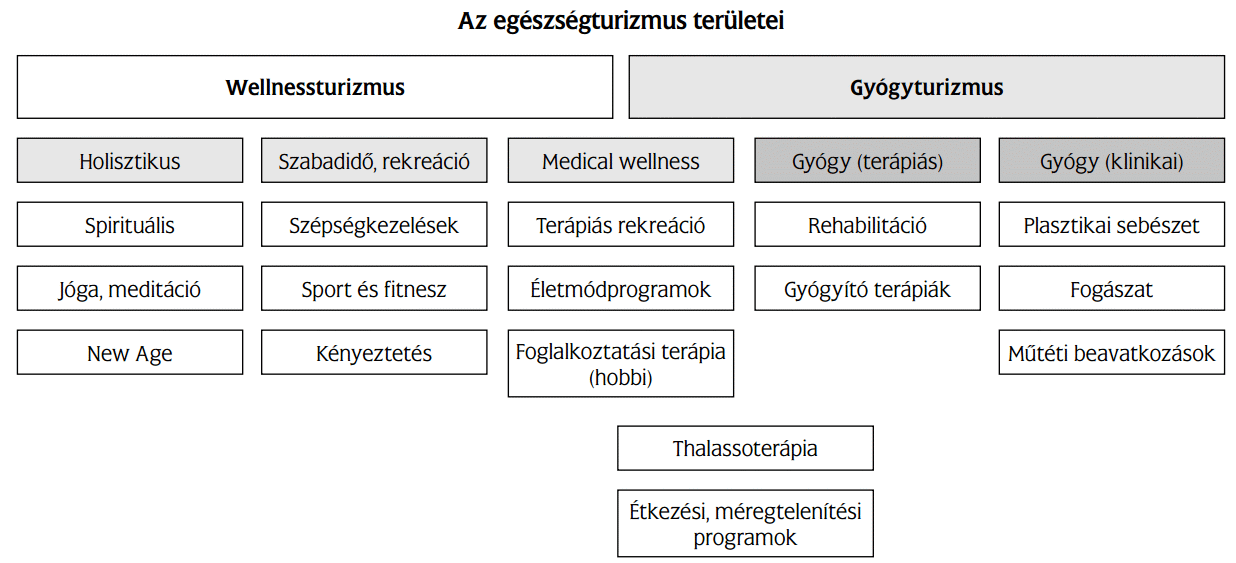The notion and sub-categories of health tourism
Health tourism is a relatively well researched area both in Hungary and abroad and today there are diverse specialized articles, journals and magazines available for researchers. Due to this fact health tourism does not have a single and accurate definition and there is no agreement on this issue in specialist literature either. It can be explained by the fact that in different cultures – even within the same country - different aspects of health tourism are emphasized. (Sziva I. 2010). On the other hand experts agree that ’health tourism is a branch of tourism in which ’the primary goal of travel is the preservation and/or the improvement of one’s state of health.’ (Michalkó G. 2004, p. 153). The preservation of good health, mental and physical conditioning (recreation), prevention, medical therapy and rehabilitation play the most significant role in health tourism. It was in 1973 that The International Union of Tourist Organizations (IUTO) redefined health tourism saying that ’it is the provision of health facilities utilising the natural resources of the country, in particular mineral water and climate“. (Smith, M.− Puczkó L. 2010). The places, which provide health tourism services and generate economic activity, are called destinations.
In a formal sense health tourism is the utilization of two kinds of services –health and tourism services- at the same time. In its functional sense it is a behaviour aimed at becoming or keeping healthy, through the use of tourism.
Depending on the motivation of travel – prevention of a disease or recovery from a disease - there are two different kinds of sub-categories: wellness-tourism and medical tourism (Figure 1). By European data about 30% of all health tourism travels belonged to the sub-category of medical tourism, while 70 % of them could be defined as wellness tourism in the year 2003.

Figure 1. Subsystems on offer by health tourism. Source: Szivák I. 2010.
(Soronként a szavak: areas of health tourism; wellness tourism, medical tourism, holistic, leisure time, recreation, medical wellness , Medical (therapeutical), medical (clinical), spiritual, beauty treatments, therapeutical recreation, rehabilitation, Plastic surgery, yoga, meditation,sport and fitness, lifestyle programmes, medical programmes, dentistry, New Age, wellness treatments, employment therapy, hobby, operations, thalassotherapy, nutrition and cleansing programmes)
The offers in the area of medical and wellness tourism are mostly – but not exclusively – related to natural factors and the services depending on them.
The therapy, using natural or artificial cures and the physical and chemical energies in them is called physiotherapy. The term itself comes from the Greek language. The word of Greek origin, „physis” means nature, while the word therapy means cure. The task of physiotherapy is the prevention of diseases, the prevention of a new attack of an earlier disease, specialized and symptomatic treatment. (Csermely. M. 2002). The subcategories of physiotherapy include spa treatment, balneotherapy, mud therapy, electrotherapy (small, medium amd high frequency and electromagnetic treatments, phototherapy, thermotherapy, mechanotherapy, medical massage, climatic therapy, drinking cures, diets and inhalation therapy. (Heim P., é. n.).
Both in medical and wellness tourism the main attraction is water. Its physical qualities (pressure, bouyancy) as well as the absorption or the inhalation of the substances in it might aid the body’s healing processes, boost the operation of bodily functions or the upkeeping of the body’s optimum condition. In addition, staying in water or performing physical movements in water relax the human psyche and give bodily pleasures. Considering the fact that waters utilized in therapies and wellness programmes are most often warm (thermal waters), the so-called thermal tourism is an outstanding component of medical and wellness tourism. Actually, it depends on the strategic choice of the individual - the potential tourist - which form of tourism or what combination of these categories he or she chooses to utilize: „medical tourism, thermal tourism or one of their versions, combined with some sport or hobby activity.’(Tasnádi J. 1998, p. 80)”.
Today health tourism in naturally not just water or some water- related treatment, but its main appeal is its diversity, a holistic, multi- faceted and complex solution of patients’ health problems.